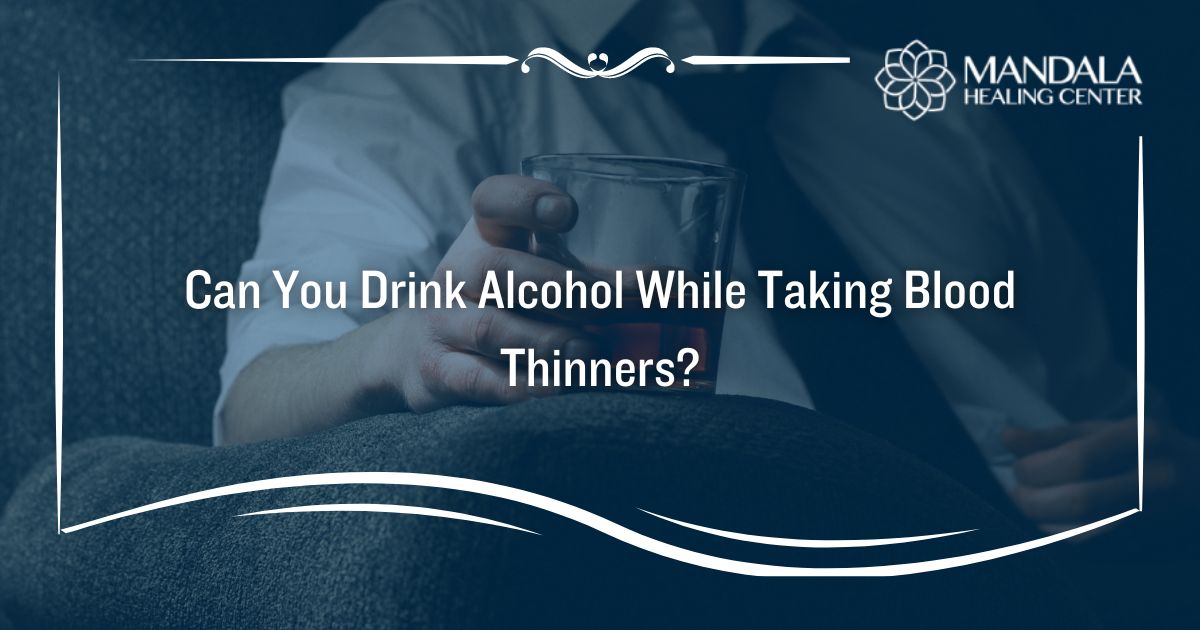Blood thinners are anticoagulants. These medications work to prevent blood clots from forming in your bloodstream. Your doctor might prescribe a blood thinner if you have heart disease, blood vessel conditions, a heart valve replacement, heart defects, or recently underwent surgery that poses a risk of forming clots.[1]
If you are prescribed blood thinners, it’s important to be aware of their interactions with other substances. For example, it is not recommended to drink alcohol while you are taking blood thinners. This is because both your medication and alcohol thin the blood, increasing your risk of bleeding, liver problems, and more.
Blood thinners can prevent you from having a pulmonary embolism, stroke, or heart attack. For this reason, you should never stop taking blood thinners that your doctor prescribes. If you are worried about interactions with alcohol and your medication, it is best to avoid alcohol intake altogether.
In this article, you will learn:
- If you can mix alcohol and blood thinners
- What are the risks of drinking alcohol while taking blood thinners
- Signs that you need medical assistance after mixing blood thinners and alcohol
Can You Mix Alcohol and Blood Thinners?
It is not recommended to consume alcohol while you are taking blood thinners. The purpose of blood thinners is to prevent clotting that can lead to heart attacks and other cardiovascular issues. This means your blood is already thinned when you are on the medication.
Alcohol also leads to thinning of the blood. In other words, drinking alcohol while you are taking blood thinners will cause a higher risk of adverse side effects. Some of the effects may include liver disease, heart disease, injuries, and alcoholism.
That said, some alcohol use is okay if you are a healthy individual, as research says men can have two drinks per day and women can have one drink per day while taking blood thinners.[2]
Certain risk factors increase the danger of combining alcohol and blood thinners. You should not drink alcohol while taking blood thinners if:
- You are younger than the legal drinking age
- You are pregnant
- You are recovering from alcoholism
- You cannot control how much you drink
- Your doctor has advised you not to drink
What are the Risks of Drinking on Blood Thinners?
While you might be able to drink small amounts of alcohol on blood thinners, it is best to avoid it altogether. Combining alcohol and blood thinners can lead to a range of risks, including increased bleeding, liver problems, heart complications, and decision-making issues that lead to injuries.
The dangers of drinking while taking blood thinners include:
Increased Bleeding
Alcohol leads to the thinning of the blood. If you are already taking blood thinners, the thinning of your blood can become amplified. Simple cuts or injuries could become extremely risky, as you might bleed more than usual.
Liver Problems
Both alcohol and blood thinners are processed by the liver. When you combine them, your liver might have a hard time keeping up. This strain on the liver could cause your body to be unable to metabolize your medication or alcohol properly, leading to unpredictable drug levels in your body.
Heart Disease
Alcohol can damage blood vessels, making you more likely to develop blood clots. If you are on blood thinners to prevent blood clots, this risk is heightened. Drinking alcohol while taking blood thinners can make the medication ineffective, increasing your risk of stroke, heart attack, and life-threatening blood clots.[3]
Decision-Making Issues
Alcohol impairs your judgment and coordination. When under the influence, you are more prone to risky behaviors that lead to injuries from falls, accidents, or other dangers. When this is combined with thinned blood from medication, you could experience severe bleeding from your injuries.
Signs That You Need Help After Mixing Blood Thinners and Alcohol
If you or a loved one experiences the following symptoms when mixing alcohol and blood thinners, you should seek emergency medical attention:
- Heavy menstrual bleeding
- Reddish or brown-colored urine
- Red or tar-like stools
- Nosebleeds that do not stop
- Signs of blood in your vomit
- Red mucus while coughing
- Severe pain or unusual bruising
- Dizziness and weakness
- Cuts that do not stop bleeding
- Experiencing serious falls or hits to the head
Due to the risks, it is best to avoid drinking while you are on a blood thinning medication.
Get Connected to a Professional Alcoholism Treatment Center
If you or a loved one suffers from alcoholism, it’s time to seek help. It can be incredibly difficult to overcome an alcohol use disorder. Thankfully, alcohol rehab programs like Mandala Healing Center will offer you the tools and support you need to recover.
Contact us today for more information on our highly-rated alcoholism treatment program.
References:
- Medline Plus: Blood Thinners
- Dietaryguidelines.gov: Dietary Guidelines for Americans
- The National Institute on Alcohol Abuse and Alcoholism (NIAAA): Harmful Interactions












